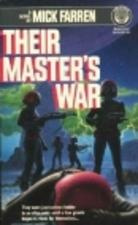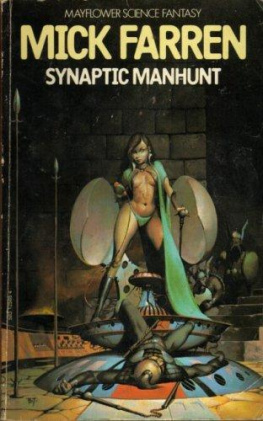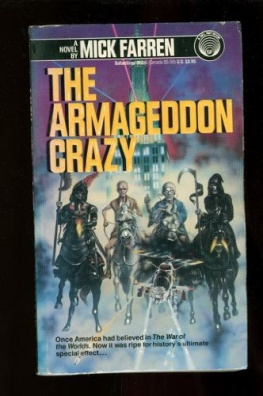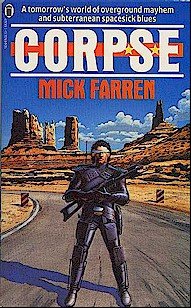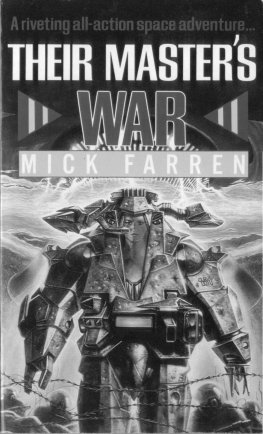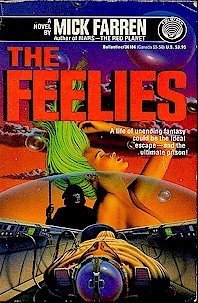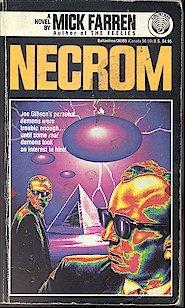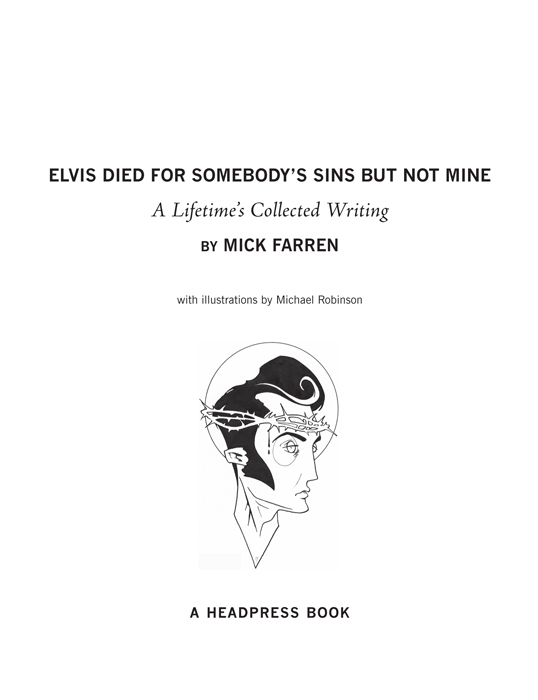ELVIS DIED FOR SOMEBODYS SINS BUT NOT MINE
Foreword
BY CHARLES SHAAR MURRAY
... and then the greasy oodlums arrived!
M ICK F ARREN IS A MAN OF MANY PARTS, AN IMPRESSIVE number of which are still working despite the natural wear-and-tear incurred by decades of research and recreation. First and foremost amongst these are brain and fingers, and this book is evidence of the excellent use hes made of those particular bits from 1967 (the so-called Summer Of Love) right up to the more-or-less present day.
At various points along that timeline highway from Young Punk to Grand Old Man Of The Counterculture, hes beenoften simultaneouslya critic, commentator, novelist, journalist, polemicist, political activist, lyricist, rock performer, screenwriter, poet, memoirist, raconteur, life and soul of many parties and a member in better than good standing of the Most Honorable Association Of Cultural Infidels.
Orto misquote an old Kris Kristofferson song memorably recorded by one of Micks primo heroes, Johnny Cashhes a poet, hes a prophet, hes a preacher and a pilgrim and a problem when hes stoned, hes a walking contradiction, partly truth and partly fiction...
And hes alsoas you can discover for yourself by randomly opening this book at virtually any pagevery sharp, very funny, very perceptive and possessed of a highly distinctive prose style: simultaneously hardboiled and self-deprecating. And it all comes from a POV as unique as said prose, which is: a rockin way of knowledge. Farren is of the generation which encountered rocknroll when it was brand new, when white kids just hittingor, to be more precise, getting hit bypuberty encountered something which had never previously existed in the world of American white-picket-fence conformity and English net-curtain-land suburbia. Something which was marketed as entertainment but which manifested, no matter how spuriously, as liberation. Hence the famous line, often heard during drug-fuelled downtime chitchat around the NME offices during Farrens now-celebrated seventies tenure there, about how everything was boring... and then the greasy oodlums arrived! Said greasy oodlum invasion was spearheaded by Elvis Presleyhence this books titlerapidly followed by the likes of Little Richard, Jerry Lee Lewis, Chuck Berry, Gene Vincent, Eddie Cochran and many more. They transformed liveswhere would John Lennon, Paul McCartney, Lord Keef Richards, Jimmy Page ad-bleedin-infinitum have been without them? but for Micky they kicked down not one wall but many, providing a point of entry into whole worlds of art, culture, literature and politics. As I said: a rockin way of knowledge, of which he turned out to be both its Carlos Cas-taneda and its Don Juan. Just how rich and varied those worlds turned out to be can be gauged by the extraordinary breadth of scope covered by the present collection; just how deceptively rigorous the intellectual processes involved turned out to be can be likewise gauged by the consistency of worldview displayed in a collection of pieces addressing so many different topics and written over such an intimidating span of time.
Im not going to recount Mickys life story: hes already done it himself, and quite brilliantly, in an autobiography entitled Give The Anarchist A Cigarette, and it comes very highly recommended indeed. All Ill tell you is this: Micky managed to attain a ranking position at the London forefront of High Hippie whilst having no truck whatsoever with the whimsy of Flower Power: no bells around his neck, mate! He favored mirrorshades, studded belts, motorcycle jackets and cowboy boots, all topped off with a spectacularly broken nose and one of the half-dozen best whiteboy fros in the known universe: part biker, part urban guerilla. He absolutely looked like a rock star, though whether he sounded like one is highly debatable: he fronted The Deviants, a band so heroically unlistenable (by 1967 standards, anyway) that their music made no sense whatsoever until the arrival of punk almost a decade later.
Within these pages youll meetvia the occasional interviewsthe likes of Frank Zappa, Johnny Cash, Chuck Berry and Gore Vidal, and steam open correspondence between the author and Pete Townshend. And, much more importantly, youre about to go one-on-one with a world-class raconteur. Micky once described his Doc40 blog in terms which apply at least as appropriately not only to the present collection but to any significant period of time spent in the actual real-life face-to-face presence of its author as his Own Cosy Leather-Jacket Gin Joint, 24-Hour Global House Party And Medicine Show, offering sharp conversation, bad ideas, cheap stimulation, dirty concepts and links to revolution...
Sounds like a good time to me. If this kind of mess-around seems like your cup of meat, then prepare your relaxant of choice, kick back and dig in. The greasy oodlums are at your door.
Charles Shaar Murray
London
February 2012
Preface
BY FELIX DENNIS
I VE KNOW M ICK F ARREN FOR LONGER THAN YOU HAVE been alive, unless you are of our generationor even older. I have fought the law with him, lectured him, listened to him, mocked him, shouted at him, shared barricades, women and whiskey with him, commissioned him, published him, laughed and cried with him, played poker with him in smoke-filled Soho rooms while the sun rose over defunct chimney pots and have called him long-distance in the wee-wee hours when there was nobody else I dared call who would understand why I needed to call anyone.
If I had to describe him in six words, they would be: talent, style, idiot savant, outlaw, friend. Not necessarily always in that order, but often enough to bet your next-to-last last dime on; unless you were in serious trouble, in which case the order could be relied upon to reverse itself swiftly. To the world at large he has played many roles: doorman, editor, journalist, rock star, rabble rouser, critic and commentator, charlatan, jester, impresario, gunsling-ing cross-dresser, icon, author, songwriter, poet andper-haps strangest of allthe Godfather of Punk.
Of Farrens writing, I have nothing to say. It speaks for itself and has done for decades. I have lost count of the hours I have spent immersed in his fictional worlds. The range of his non-fictional subjects is remarkable, of course, and much of it was written to make money; but as Dr. Johnson once remarked: no man but a blockhead ever wrote, except for money. Certainly, much of what Mick has written over the years in plays, columns, dialogues and poetry never earned him a cent. All the same, these select remnants have survived the test of time in fine fettle. As Jenny Fabian put it when reviewing Give The Anarchist A Cigarette, I found myself laughing all the way to the memory bank as I gulped down the originals and the wry commentary in the margins.
I will leave you with a short anecdote. We are in downtown Manhattan more than a quarter of a century ago and Mick is living in a small house near a river tunnel with his long-suffering second wife, Betsy. They have invited me and my aged mother (who is visiting New York during the Christmas holidays) over for a Boxing Day drink.
When we arrive, I find that Mick has laid out his entire robot collection over the living room floor. After my mother has been introduced and shepherded to a chair with an enormous gin martini in her hands, Mick begins the complex task of starting-up each robot. Pandemonium erupts as scores of androids begin their noisy mechanical march across rugs and floorboards while our hero solemnly intones rubbish from Chairman Maos Little Red Book.


